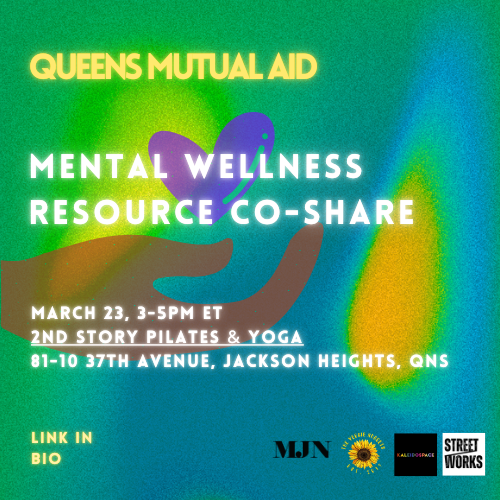March 23, 2025: Mental wellness resource co-share
On March 23, QMA held a mental wellness co-share on March 23, 3-5pm ET at beloved 2nd Story Pilates & Yoga— thank you Elaine!
Mental wellness surfaced early in QMA meetings as something folks felt was important and wanted to work on together. The event was meant to invite folks to dive deeper into why we felt it was needed, what we should do about it, and what resources were already out there — affordable healers, therapists, organizations, literature, and community networks. Below is a synthesis of what we asked each other, and collective responses.
Q: Are many folks in our community struggling with mental wellness?
A: Yes. This is widespread. And the services that currently exist are not sufficient.
Q: Why is this needed? What is missing and needed?
We heard repeatedly that our communities need mental wellness care that is:
Affordable
Existing services are too expensive for too many. Love and care shouldn’t carry a price tag—but our current economic systems make truly accessible support out of reach.
Jargon-Lite
We must de-center clinical and Western-centric language. Not everyone speaks that jargon, and it shouldn’t be a barrier to receiving care. Care should include space for people to name their experiences in their own words, with practitioners who understand and respond through diverse “languages” like art, movement, medicine, nutrition, and spirituality.
Norm-Challenging
We are normal! Many of us experience chronic sorrow, depression, and other mental health challenges—so why is this considered abnormal? We need to reframe care as a natural part of life, not as a correction for deviance. Healing is a lifelong practice, not a destination.
Culturally Connected & Woven Into Daily Life
Cultural stigma silences people. In some communities, mental health struggles are punished by shaming or ostracization. Instead of forcing people into clinical systems, we should integrate wellness into everyday environments—on the street, in cultural spaces, and in language that doesn't reinforce false difference.
Collective, Not Just Individual
Our struggles don’t exist in isolation—they’re often related to systemic injustice. The fact that care is often individualized makes it seem like it is our problem and our fault. But alot of our mental health issues are the result of broken systems, and that means that our individual wellness and collective wellness are related. Individual wellness can and should be a collective responsibility.
Blended
Western medicine is not the only path to healing. Many people feel over-medicalized and underserved by pharmaceutical solutions that don’t address root causes — like economic injustice, or social isolation, and work. Wellness is not one dimensional. For example, it might also look like legal support, community gardening, financial counseling, or a reading circle.
Next Steps?
The group leaned towards organizing more open space to work, plan, and offer as we go. We are looking for volunteers to help carry everything forward!
Public Office Hours: Create consistent, welcoming spaces for peer-led support. These spaces could operate in cultural centers, libraries, or parks—wherever folks already gather. If this is a shared priority, we’ll need volunteers to help staff and shape it.
Define Our Offerings: Work together to clarify what kinds of support, referrals, and community-based resources we can responsibly offer. Think: mental health first aid, info-sharing, healing circles, translation help, and more.
Monthly Planning Sessions: Host monthly meetings to co-develop and expand our mental health resource pool, plan future events, and keep the work connected to what people need.
Resources Shared
Movement as Medicine: Recognizing the power of physical movement in healing.
Second Story offers community classes in Queens: $5–$10 per session. Thank you, Elaine!
Dr. Z, Dragon Combat Club: Martial arts fosters mental wellness! Fellow Dr Z on Instagram to learn more.
Mindfulness-Based Stress Reduction (MBSR):
Free 8-week online course at Palouse Mindfulness
Finding support:
FindHelp.org – Search for local, low-cost mental health and social services by ZIP code.
NYC WELL – Free, 24/7 support in over 200 languages: call 1-888-NYC-WELL or text “WELL” to 65173
Inclusive Therapists NYC – Directory focused on mental health providers centering marginalized identities, including BIPOC, LGBTQ+, disabled, and immigrant communities.
Community centers:
Project Renewal – Offers integrated health services (including psychiatry and addiction treatment).
Sakhi for South Asian Women – Offers mental health support, counseling, and advocacy for South Asian women and gender-expansive survivors.
Turning Point for Women and Families – Mental health and community support for Muslim women and girls in NYC.
Support & Emergency Resources
Call 988 – 24/7 national mental health crisis line
Dial 711 then 988 – For hard-of-hearing access
Text "WELL" to 65173 or call 1-888-NYC-WELL – NYC-based multilingual emotional support
Text "GOT5" to 741741 – Peer support via Crisis Text Line
When/Where It Was
March 23, 3-5pm ET
81-10 37th Avenue, Queens, NY, 11372, United States

